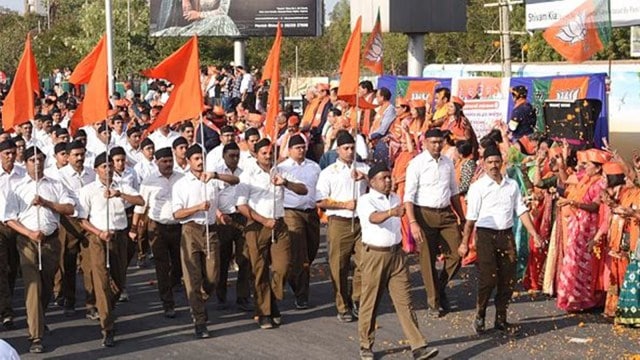
Ram Madhav is one of the intellectual faces of RSS. He was the RSS spokesperson for more than a decade (2003-2014) and was loaned to the BJP in 2014, becoming one of its most promising general secretaries. Currently, he is back with the RSS. It is expected then, that his views and perspectives on different issues reflect an authentic RSS views. In a recent article (‘The kite-flying about RSS’, IE, May 25), he stated that those who were talking of RSS being part of the electoral politics were “kite-flying” – either falsifying or misrepresenting the RSS’s stand that it is aloof from politics.
It is interesting to note this “kite-flying” did not begin with detractors of the RSS but by BJP President J P Nadda who, on May 18, stated that “In the beginning, we would have been less capable, smaller and needed the RSS. Today, we have grown and we are capable. The BJP runs itself. That’s the difference.”
RSS as ‘non-political’
According to Madhav, the RSS long ago “after prudent consideration” decided to keep “a distance from the day-to-day and especially from, electoral politics”. However, the RSS allowed swayamsevaks to join any political party that did not believe in violence and secret methods. In support of non-political RSS, Madhav quoted its most prominent ideologue, M S Golwalkar, who “summing up the RSS’s sentimental reticence for politics” declared that “Personally, I am outside politics” and “Why should people drag us into politics? We are happy with them as politicians and ourselves as swayamsevaks”.
What do the RSS archives say?
We must compare the above statements with two others by Golwalkar. The first statement tells us about the kind of people sent in to politics and what is expected of them by the RSS.
While delivering a speech on March 16, 1954, in Sindi, Wardha, he said, “If we say that we are part of the organisation and accept its discipline then selectiveness has no place in life. Do what is told. If told to play kabaddi, play kabaddi; told to hold meeting then meeting… For instance some of our friends were told to go and work for politics that does not mean that they have great interest or inspiration for it. They don’t die for politics like a fish without water. If they are told to withdraw from politics then also there is no objection. Their discretion is just not required.” [Golwalkar, M S, Shri Guruju Samgr Darshan (collected works of Golwalkar in Hindi), Bhartiya Vichar Sadhana, Nagpur (RSS publication house), vol. III, n. d., p 32]
The second statement clearly highlights the high political ambitions of the RSS. While addressing leading RSS cadres at Indore on March 5, 1960, Golwalkar said, “We know this also that some of our Swayamsevaks work in politics. There they have to organise according to the needs of work public meetings, processions etc., have to raise slogans. All these things have no place in our work. However, like the character in a play, whatever role has been assigned should be portrayed with (the) best of capability.” [Ibid, vol. iv, pp 4-5.]
Golwalkar, in this instance, is referring to the swayamsevaks loaned to political satellites as “nat” or performers who are meant to dance to the tunes of the RSS. It is important to note that Golwalkar’s design of controlling the political arm of the RSS was elaborated in March 1960, almost nine years after the establishment of Jana Sangh (the forerunner of the BJP) in 1951.
Part of the Sangh
The claim that the BJP is an independent political organisation needs to be compared with the facts available in the official publications of the RSS. The central publication house of the RSS, the Suruchi Prakashan, published a book, Param Vaibhav Ke Path Par (The Road to Great Glory) by a prominent RSS leader, Sadanand D Sapre, in 1997 which provides details of more than 40 organisations created by the RSS for different tasks. The BJP as a political organisation figures prominently in it, clubbed with the ABVP, Hindu Jagran Manch, Vishva Hindu Parishad, Swadeshi Jagaran Manch and Sanskar Bharti.
In this book, the BJP figures at number three in the list of prominent organisations created by the RSS. It gives details of the creation and development of the Bharatiya Jana Sangh (the forerunner of the BJP) and then the BJP by the RSS for the purposes determined by the latter.
In the light of the above disclosures in RSS publications, Madhav’s statement that RSS members like Balraj Madhok and Syama Prasad Mookerjee founded the Bharatiya Jana Sangh in 1951 independently needs a relook. It should also be noted that this entry into electoral politics by RSS was in blatant violation of the promise which Golwalkar made to Sardar Patel as a condition for lifting the ban on the RSS after Gandhiji’s assassination. It was also in direct contravention of the Article 4 (B) of the constitution of the RSS which, to quote Madhav, “categorically states that ‘the Sangh, as such, has no politics’”.
The writer taught political science at the University of Delhi and is the author of Hindu Nationalism and RSS.


